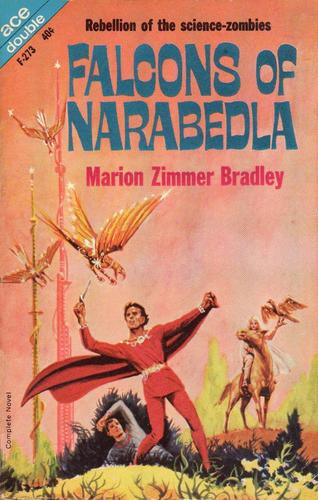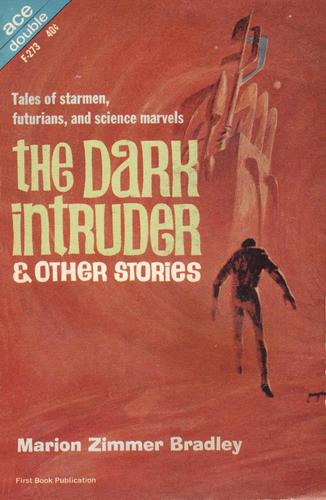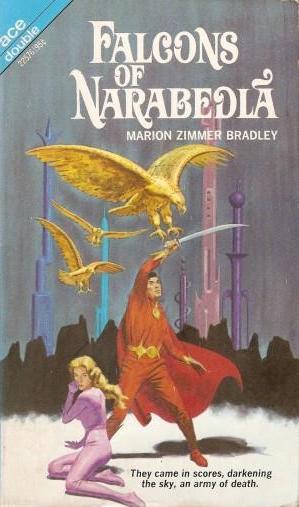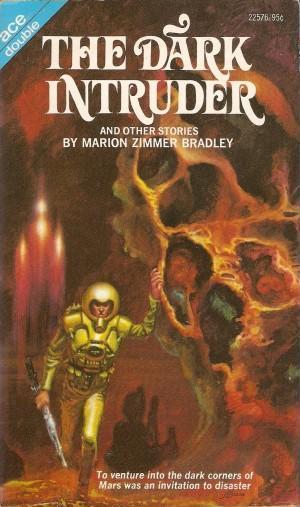The Problem With Marion Zimmer Bradley: Rich Horton on Falcons of Narabedla/The Dark Intruder
 |
 |
In a recent review at his blog Strange at Ecbatan, Rich Horton tackles the thorny subject of Marion Zimmer Bradley, one of the top-selling fantasy writers of the 20th Century (The Mists of Avalon, Darkover) head on.
In 1964… Marion married Walter Breen, a fellow SF fan and a noted numismatist, within a month. Breen was already well known as an advocate of pederasty, and MZB certainly knew of his proclivities, and indeed Breen had been banned from at least one SF convention in that time period. Breen had been convicted of pederasty-related crimes as early as 1954, and continued to have trouble with the law, finally going to jail after another conviction in 1990. MZB managed to dodge serious consequences of her husband’s activities throughout her life, and she died in 1999. In 2014 her daughter, by Breen, Moira Greyland, accused her of sexual abuse, and in retrospect it seems to me that it should have been clear all along that Bradley was at least negligently complicit in her husband’s crimes, certainly aware of them, and now it appears more likely than not that she was a participant herself. (Though I suppose I must add that damning and convincing as the accusations seem, Bradley never did have a chance to defend herself against those that came after her death, though some of her own testimony given during Breen’s legal troubles is chilling enough.) This has understandably had a devastating effect on her reputation — and she was not really a good enough writer to make it likely that her work will long survive the posthumous stain. Jim Hines briefly discusses this, with links to more direct information, in a good blog post here.
With that preamble, he has another look at Bradley’s 1964 Ace Double, the novel Falcons of Narabedla paired with the collection The Dark Intruder.
Falcons of Narabedla is on the one hand a very pulpy short novel, with a hackneyed basic premise (man snatched out of time into another world), and such standard features as anachronistic sword-fighting, aristocratic societies and rebellion, and an overly rapid conclusion. On the other hand, there are some pretty intriguing ideas that could have stood further development, and the book as a whole reads rapidly and excitingly… It opens with Mike Kenscott camping in the Sierra Madres with his younger brother. Mike is an electrical engineer who has been acting strangely since he had an accident with some equipment he was working, and he has had occasional odd “memories” of strange birds and the like. Suddenly he finds himself waking in a strange tower, looking over a much changed Sierra skyline, with two suns in the sky. The people with him call him “Adric”, and he has no idea who they are. And a look in the mirror shows a much different man…
Ultimately a pretty minor book, but it does hint at some of what made the best of Bradley’s Darkover novels pretty good stuff.
Marion Zimmer Bradley’s short fiction career has a slightly odd shape. She first made her name as a fan, writing colorful letters to magazines like Thrilling Wonder Stories, using pseudonyms like Astara. In 1953 she sold two stories to the very low end and short-lived magazine Vortex, and beginning in 1954 she started selling more regularly to better magazines… The Dark Intruder and Other Stories, then, appearing after her first run of short fiction had ceased, serves as a documentation of that phase of her career. Except for the title story, these are fairly short pieces, definitely SF and not Fantasy, turning on cute and sometimes mordant ideas.
“The Dark Intruder” (15,000 words) (Amazing, December 1962, as “Measureless to Man,” a far better title) — Under its original title, this story appears on my list of stories with titles from “Kubla Khan.” It’s set on Mars. Andrew Slayton is part of the third archaeological expedition to the deserted ancient Martian city called Xanadu. The members of the previous two expeditions died violently. Andrew stumbles into the desert near the city and finds himself possessed by the mind of an ancient Martian. Somehow, due to his own strength and the restraint of his possessor, he retains his sanity. He learns a secret about the dying Martian race, and must try to find a solution for their unique problem. Not a bad story…
“Black and White” (3,900 words) (Amazing, November 1962) — After the holocaust, the last man on Earth is black, and the last woman on Earth is white. Can they possibly marry and further the species? That would be too silly for words, but MZB is a little better than that — the real conflict is that the black man is also a Catholic priest, struggling with his celibacy vows, and using race as an excuse. Then they encounter one more man — unfortunately he’s a moronic Southerner, and the results are bitter. Not too bad of a story, especially for the time.
Falcons of Narabedla/The Dark Intruder was published by Ace Books in 1964. It is 127+124 pages, priced at 40 cents. Both covers were by Jack Gaughan.
It was reprinted in December 1972 with a new set of covers (below) by Mitchell Hooks and Kelly Freas. This version was priced at 95 cents.
 |
 |
Read Rich’s complete review here.
Our recent coverage of Ace Doubles includes:
King of the Fourth Planet/Cosmic Checkmate by Robert Moore Williams and Charles V. De Vet & Katherine MacLean
Our Man in Space/Ultimatum in 2050 A.D. by by Bruce Ronald and Jack Sharkey
Rocannon’s World/The Kar-Chee Reign by Ursula K. LeGuin and Avram Davidson.
The Plot Against Earth/Recruit for Andromeda by Calvin M. Knox and Milton Lesser
Warlord of Kor/The Star Wasps by Terry Carr and Robert Moore Williams
The Sun Saboteurs/The Light of Lilith by Damon Knight and G. McDonald Wallis
Wandl the Invader/I Speak For Earth by Ray Cummings and Keith Woodcott (John Brunner)
The Sioux Spaceman/ And Then the Town Took Off by Andre Norton and Richard Wilson
Secret of the Lost Race/ One Against Herculum by Andre Norton and Jerry Sohl
Clockwork’s Pirates/Ghost Breaker by Ron Goulart
ATTA/ The Brain-Stealers by Francis Rufus Bellamy and Murray Leinster
The Ship from Atlantis/ The Stolen Sun by H. Warner Munn and Emil Petaja
Vulcan’s Hammer / The Skynappers by Philip K. Dick and John Brunner
The Ship That Sailed the Time Stream by G.C. Edmondson
Bow Down to Nul / The Dark Destroyers by Brian W. Aldiss and Manly Wade Wellman
See all of our recent Vintage Treasures here.
>’She was not really a good enough writer-‘
Try Hunters of the Red Moon and The Survivors, with her brother Paul Zimmer (what happened to him? excellent martial-arts sword and sorcery on his own). The later Darkover stuff was aimed at feminists, so I don’t really know if it was any good, but they sure seemed happy. Her stories in the Thieves World series were good. I liked The Planet Savers, an early Darkover short novel, and The Door Into Space, set in Not Quite Darkover. The magazine she edited, was well edited. Last and best, the romance Ghostlight series by Rosemary Edgehill
(does good stuff on her own) published under Bradley’s name and roughly following Bradley’s Dark Satanic setting- the best psychic detective stuff since Manly Wade Wellman.
This picking at a writer’s moral character is silly and unliterary, whether with Bradley or Vox Day. Most good writers are sedentary neurotics. Most critics are worse.
> This picking at a writer’s moral character is silly and unliterary
Bruce,
I beg to differ. Rich isn’t “picking at Bradly’s moral character.” He’s making the honest assessment that her work probably won’t survive this scandal.
He’s almost certainly right. Bradley’s been dead for 17 years, and virtually her entire output (with the exception of The Mists of Avalon and its sequels) has been out of print for well over a decade.
It takes a minor miracle for a writer to surge back into print after that long an absence. It takes a publisher willing to take a risk… and few (if any) publishers would be willing to take such a risk on her today.
Worse, while sites like Black Gate and many others are doing what we can to keep the conversation going around Clifford Simak, Leigh Brackett, Robert E. Howard, and many, many other writers we love, I don’t see that happening for Bradley. Few sites will touch her.
Without determined fan attention, and a publisher willing to take a very major risk on her, her fate is almost certainly sealed. She’s mostly forgotten now, and she’ll be totally forgotten in 10-15 years.
Rich is just being frank in his comments. And I think he’s dead right.
Bruce: “This picking at a writer’s moral character is silly and unliterary”
Not the way I would’ve worded it, but I agree with the sentiment behind Bruce’s comment.
I think it’s natural to want to know biographical details about writers, especially those who’ve really affected us. And I think good clear moral judgments can and should be made after thorough investigation. (And though I’m not invested enough to go any farther, Rich Horton’s terse comments hardly count in my estimation as good evidence given the heinousness of the accusations.)
But I don’t understand why SF&F people seemingly inclined to make prescriptive judgments about whether an author should be read or not when the examination of such an author’s life doesn’t hold up to scrutiny (even if justified)? If we did that to every writer in my field of philosophy, we wouldn’t ever be able to study the books of anybody!
Such posts, in my opinion, seem to only contribute, or at least suggest a sort of mood or atmosphere of McCarthyism or witch-hunting within the SF&F community. For that seems to be what results once we find out certain details that are not popular.
Hopefully there’s no award with Bradley’s face on it or her name attached to it. The SF&F community would probably be spurred on to have it removed. Come to think of it, has anyone looked into the details of the lives of Campell, PKD, or Tiptree? Surely something scandalous can be found in those editors/authors’ lives that would morally obligate their work to be justifiably judged and ignored.
I most certainly did not make a prescriptive judgment on whether or not Bradley should be read based on her character. Please show me where I did that! I made a judgment as to whether her (perceived) character might affect the future sales/reputation of her books — and whether you like it or not, whether its even fair or not, I think my judgment in that area is logical.
I talked about a pretty goddamn important “elephant in the room” about Bradley’s own life, and her husband’s life, and crimes. To ignore that is, frankly, irresponsible.
Does that mean her books should be banned? Of course not. And if I thought so, I wouldn’t be writing about them — and I’ve written about her twice in this place (and at my blog) in the last couple of months.
My judgment that she wasn’t a good enough writer to survive the scandal surrounding her is only that — my judgment, based first on my personal opinion as to the literary and entertainment value of her work. My opinion — as I hope I’ve made clear — is that her works were often enough decently entertaining — and I read most of the Darkover books with much enjoyment for a long time; but that they were not brilliant books. As John points out, most books — even great ones — are at risk of obscurity after only a few years. Lesser books are at a greater risk. The second judgment I’m making is cultural. Bradley has been accused — posthumously — of terrible acts. Her husband was convicted of terrible acts. Right or wrong, that fact will make it more difficult for future champions of her work to generate enthusiasm for a revival. If her work was better, that might not matter.
Is she the only writer with a dark past? Of course not. And I learned long ago that I couldn’t choose who to read based on what I knew (rarely enough anything, mind you!) about their character, good or bad. I choose based on their writing. But it would be silly to think that her posthumous reputation won’t affect the future of her books.
Mind you anyone is more than welcome to disagree with me about the quality of her writing — that’s my opinion, and for sure yours may differ.
+
What’s more, perhaps it’s unfair of me, but I suspect if I didn’t mention Bradley’s past, I would get accused of being an SJW trying to whitewash the sins of a prominent lesbian writer.
If I want a good cake, I don’t vet the baker, I just taste the cake. If I want a good tomato, I don’t vet the farmer, I just examine the fruit. If I want to listen to a symphony, I don’t vet the composer, I evaluate the piece of music as I listen to it.
With writing, I only care about what’s on the page, because that’s what I’m going to read, and for me, reading is the point of a book.
Tolstoy had an uncontrollable temper and beat his serfs, Dickens was a domestic tyrant who made life miserable for his wife and children, and Byron’s sexual behavior was so extreme as to border on the pathological (Just ask his sister.) The thing is, there’s no where else to go to get what you get from Anna Karenina, Bleak House, or Don Juan. Those three writers had the market cornered on that kind of brilliance. But for reasonably competent, lightweight, fast-moving adventure science fiction (and that’s Bradley’s category, honestly)…well, you could read a different author every day and never run out of that kind of stuff.
We all make allowances to some degree or other (Polanski, anyone?),and the line we draw will be different for each of us – but we all make allowances, and separate the art from the artist. Generally speaking, the greater the achievement, the greater the allowance. But when you have an achievement that is far from being unique or toweringly brilliant, and on the other side of the scale you have acts that just about everyone would consider to be inexcusably vile and damaging, well then, that doesn’t bode well at all for the continued longevity of a writer’s work – though, as I said, everyone is free to draw the line where they wish.
I think that was Rich’s point.
@Mr. Horton
Perhaps your response was to the above Bruce and myself. But I’ll respond back as if you only responded to me.
I only made one comment that was directed specifically at your post, namely: “Rich Horton’s terse comments hardly count in my estimation as good evidence given the heinousness of the accusations.” What this was referring to was the following comment that John O’Neill reported:
“[I]n retrospect it seems to me that it should have been clear all along that Bradley was at least negligently complicit in her husband’s crimes, certainly aware of them, and now it appears more likely than not that she was a participant herself.”
Unless your original post gives a lot more evidence (which I did not read, and admitted as such in my original comment), I’d say that conclusion is not warranted.
But beyond that, I was making no claim or accusation about you giving any sort of prescriptive judgment concerning Bradley’s work. I was very careful in the wording of my original comments, and there was no sneaky implication that was meant. If you read it as such, I apologize for not being clearer.
What I was getting at was precisely related to a comment you also made in response, namely: “I suspect if I didn’t mention Bradley’s past, I would get accused of being an SJW trying to whitewash the sins of a prominent lesbian writer.” I don’t know what an SJW is, but that’s the sort of atmosphere that I was referring to in my comments that for some reason dirty laundry (or good laundry) of an author be exposed and that should have implications for how we should think of his or her work.
Again, I think any interested fan would want to know about the details of favorite writers. But as you also affirmed, the work can be judged and appreciated apart from the author.
Again, apologies for not being clearer.
Probably responding more to Bruce, and maybe I was a mite too sensitive anyway.
My post indeed does not give any evidence directly — instead it gives a link to Jim Hines’ post on the same subject, which gives a lot of pretty damning evidence (again, in my view), and, again, partly by further links. I didn’t feel I could possibly do the entire subject justice in the scope of my post.
MZB tried to kill her daughter, everyone knows that, correct? Perverse as Shelly was, at least he stuck with adults. MZB and her husband raped children.
>John- ‘She’s mostly forgotten now, and I think she’ll be completely forgotten in ten or fifteen years.’
>Rich- ‘. . .It would be silly to think her posthumous reputation won’t affect the future of her books.’
The sinister glamour of felony sex crime accusations will probably keep drawing attention. She wrote a lot of crap I hope won’t be revived, but I’d like to see Hunters of the Red Moon and The Survivors back in print. The Ghostlight stuff has a better shot, and deserves it.
Rich, you wrote a good post. You were right to mention MZB’s child abuse. But Falcons of Narabedlia is a badly written book, and the short story collection is worse. I wish you’d focused on her good stuff. Yes, I know I’m not your boss.
Thanks, Bruce. I should note I wrote that original review a decade or so ago. And that the main reason was my interest in Ace Doubles.
There’s no question that she wrote a lot of much better stuff — Falcons was her first novel (though somewhat revised) and she really was not at her best as a short story writer.
I’d recommend most of the Darkover books from about the mid-’60s to the mid-’70s as her best stuff.
A bit late to the party, but after ‘hearing’ about the accusations (I’ll read the linked Hines article for more info) I began to notice something.
I ply the many thrift stores in my neck of the woods (Nature Coast, FL) looking for great genre fiction, and everywhere I go I find (but don’t buy) tons of her books.
It would appear even her fans are dumping her work.
Gruud, You are correct, people are dumping her books. Some are donating proceeds from sales to charities. See: http://wildhunt.org/2014/06/marion-zimmer-bradley-abuse-and-cautionary-tales.html